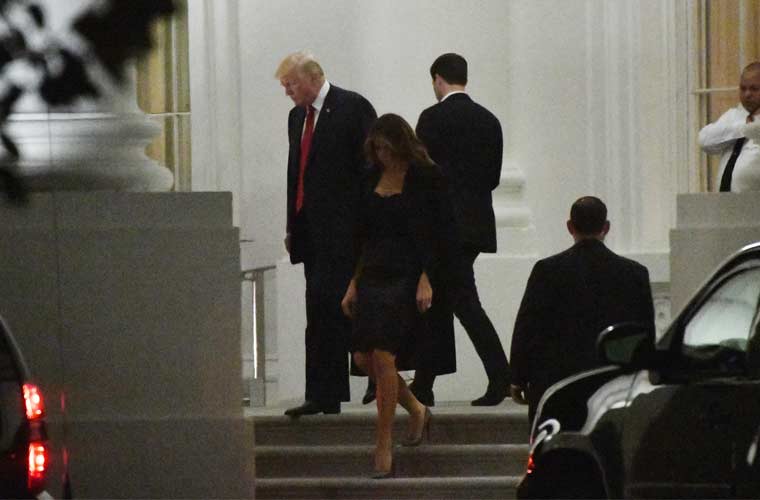Trending Now
- 830 voters names go missing in Kavundampalayam constituency
- If BJP comes to power we shall consider bringing back electoral bonds: Nirmala Sitaraman
- Monitoring at check posts between Kerala and TN intensified as bird flu gets virulent in Kerala
Around The Web
German election: Merkel wins fourth term but far-right AfD surges to third
![]() September 25, 2017
September 25, 2017
Chancellor returns but with diminished authority as first openly nationalist party in decades enters Bundestag
Angela Merkel has secured a fourth term as German chancellor but with her authority diminished, after her conservative bloc secured the lead position in parliamentary elections but failed to halt the march of rightwing populists.
Alternative für Deutschland (AfD) was celebrating its historic third place success last night, having secured 13% of the vote, according to exit polls, marking the first time in almost six decades that an openly nationalist party will enter the Bundestag.
Merkel’s centre-right Christian Democrat-led alliance secured 33% of the vote, according to exit polls, about 12 points ahead of her main rivals, Martin Schulz’s centre-left Social Democrats, which secured around 21 points, marking the poorest result for Germany’s oldest party since 1949 and pushing it on to the opposition benches.
Addressing CDU supporters in Berlin, a somewhat subdued-looking Merkel thanked “voters who put their trust in us”. Despite recognising that it was her party’s worst result since 1945, she said the “strategic goals” of the CDU’s election campaign had been reached, and gave her a clear mandate to form the next government. But she called the outcome “a result that was not as good as we had expected”.
She also promised to listen to the “concerns and anxieties” of AfD voters in order to win back their votes.
AfD’s propulsion into parliament just four years into its existence gives the country its first far-right force on the national stage since 1961, and a faction with the most substantial presence of rightwing extremists since the Nazi era.
AfD will become the third largest party and is on course to occupy 88 seats in the Bundestag, compared with 217 for the CDU/CSU and 137 for the the SPD.
Alexander Gauland, the AfD’s top candidate, reacted immediately to the news. Addressing euphoric party members at the party’s Berlin headquarters, he said: “This is a great day for our party political history. We are entering the Bundestag for the first time and we will change this country.”
He said the AfD would “hunt” Merkel over her refugee policy, renewing his party’s calls during the campaign for a parliamentary committee to examine the legal grounds on which she opened Germany’s borders during the refugee crisis of 2015. He added: “We will take our people and our country back.”
Despite clear analysis that fear triggered by the refugee influx and its aftermath was the single biggest reason for the AfD’s surge, Merkel repeated her conviction in a fiery televised exchange between party leaders that she had no option other than to allow into Germany the estimated 1 million people who arrived in the summer of 2015. Some observers called the election a belated national referendum on the refugee policy. It was the first national election since the crisis.
The victory was seen as a bittersweet one for Merkel, with her alliance having lost about 8% of the vote compared to the last election. The SPD was down by almost 5%.
The AfD gained more than 8 points on its 2013 result, when it failed to reach the 5% hurdle that would have allowed it into the Bundestag. Thirty-five percent of its supporters were first-time voters.
Voter turnout stood at 77% – a 5.5-point increase on 2013 – after voters were urged by leaders of the mainstream parties to turn out in force in an attempt to counter the rise of the right.
The country faces weeks of drawn-out coalition talks between the parties, about who will form a government with the CDU/CSU.
A repeat of the so-called “grand coalition” between Merkel’s conservative alliance and the SPD would amount to 354 seats – 316 are required to form a government – but was vehemently ruled out by Schulz, who in Sunday night’s post-result TV debate called Merkel’s election tactics “scandalous” and accused her of creating the political vacuum that was filled by AfD.
A second option is a “Jamaica alliance” – so called because the parties’ colours make up the Jamaican flag – between the CDU/CSU, the resurrected Free Democratic party (FDP) and the Greens, which would have 356 seats. But the constellation has never been tried in the national parliament before and is fraught with potential difficulty, not least a clash over environmental issues between the FDP and Greens and resistance in the FDP towards eurozone changes proposed by France’s president, Emmanuel Macron, to which Merkel has given her backing.
Renate Künast, a leading Green, whose party did better than expected with 9%, said the result had to be seen as a slap in the face for the government but that it was the responsibility of all parties to address the concerns of AfD voters. “We must respond to the AfD voters and those people who clearly feel misunderstood,” she said.
The results followed a campaign that had been decidedly dull, with the CDU/CSU and SPD appearing determined to avoid tackling the emotions triggered by the refugee crisis, while AfD ensured the issue was at the top of its campaign agenda, often addressing concerns such as the impact that Muslim migrants were perceived as having on German society.
AfD supporters were vociferous protesters at Merkel’s rallies throughout the campaign, repeating their claims that she was a traitor and calling for her to go.
Advertisement
The results provoked a demonstration on Berlin’s Alexanderplatz, with hundreds of anti-AfD protesters gathering with banners against the party. Some shouted “Nazis raus” – “Nazis out” – as police sought to protect AfD supporters and journalists entering and leaving the AfD election party.
Speaking to crestfallen supporters, Schulz pledged that the SPD would “bear the consequences” and enter the opposition benches. He said voters had signalled that they did not wish a continuation of the grand coalition between the SPD and CDU/CSU, which has dominated most of Merkel’s time in government since 2005. “Today is a difficult and bitter day for social democracy in Germany,” he said, adding that the party had “failed in our election purpose” and had not managed to mobilise the party’s traditional base.
Christian Lindner, the head of the pro-business FDP, celebrated the fact his party was back in parliament, having bowed out in 2013 when it received less than 5%. The FDP is on course to enter a coalition government. “From now on there is once again a Freedom faction in Germany, because the people allowed us to make a comeback,” he said, calling the result a “new start” for his party.
During an hour-long television debate known as the elephant round table, AfD’s Jörg Meuthen was given a hostile reception by the other party leaders. When he tried to rubbish claims that members of his party were overtly racist or had tried to justify aspects of Nazism, he was bombarded with statements made during the campaign that had provoked outrage. He said his party had a duty to “continue to be provocative” when in parliament.
























